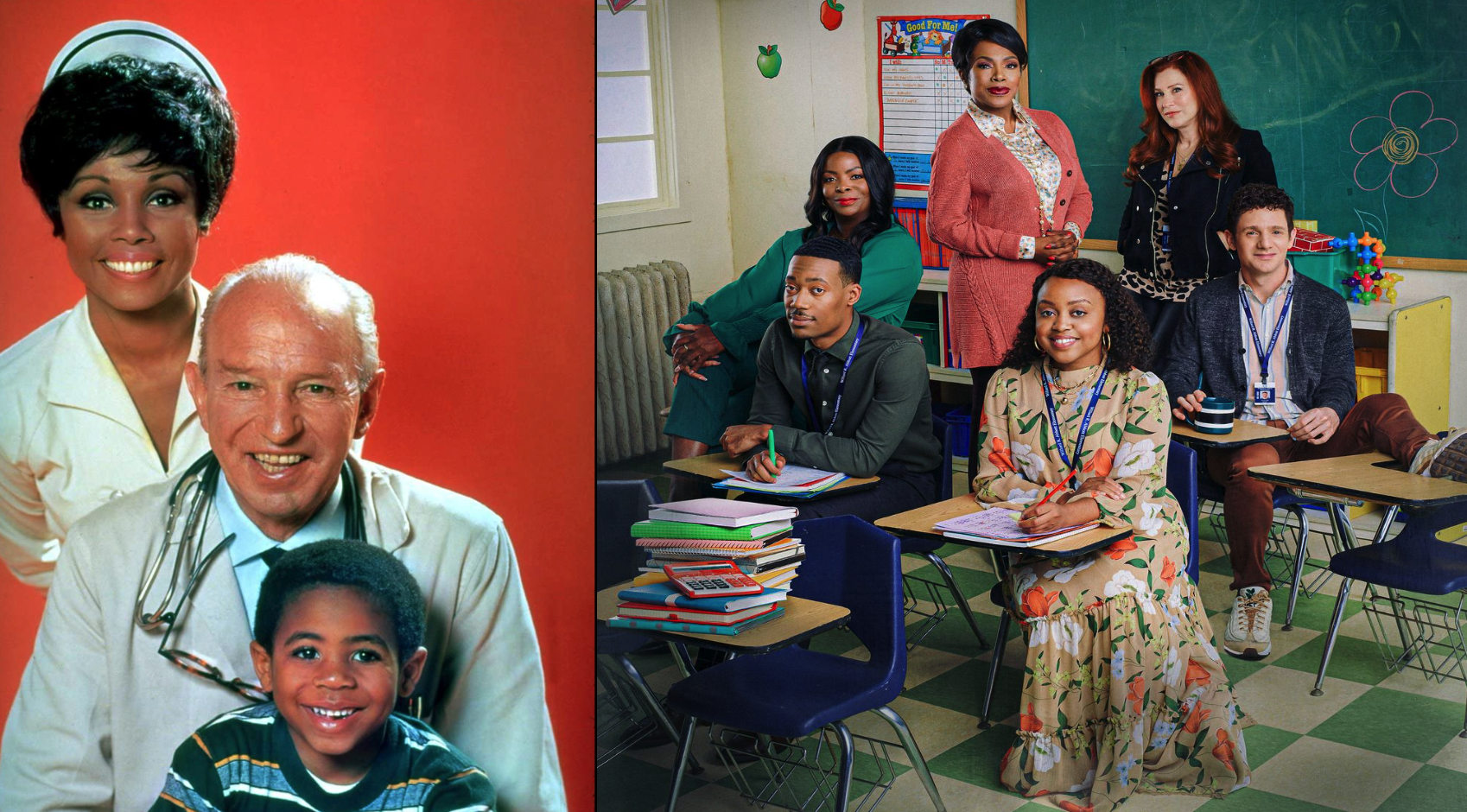(L) The cast of the 1968 show “Julia” the first sitcom on NBC that starred an African American leading woman in a non-stereotypical role. (R) The predominantly African American cast of the Emmy award-winning NBC sitcom “Abbott Elementary” the season two premiere of the show in 2022 was notable for being the highest in ratings for a comedy television broadcast in over 3 years for NBC. Photo by Joseph Sanker.
By Joseph Sanker Staff Reporter
“And the Emmy goes to…Sheryl Lee Ralph!” shouts comedian Amy Poehler, who is presenting the Emmy award for “Best Supporting Actress in a Comedy Series.’ A shocked expression fills her face, her jaw agape as family, friends and fellow cast members surround her with smiles, laughs and cheers, assuring her that it is in fact, not a dream. Actress Sheryl Lee Ralph has now become the first African American woman to win the award in this particular category at the Emmys in over 30 years for her role in the predominantly African American casted ABC sitcom “Abbot Elementary.”
“Abbot Elementary” is one of many shows emerging in the last decade that features a predominantly African American cast alongside shows like “Insecure,” “Atlanta” and “Blackish” that depict African Americans going about the struggles of life through a perspective of a minority that historically hasn’t always been represented on television.
Phillip Bolden, a middle-aged African American man, has been working in quality control in Television since the 1980s. As an African American man who has been actively working in the television industry for decades, Bolden describes how rare it used to be to see African Americans on television in any capacity.
“When I was a kid, there were no Black people ever on TV or in film. And if there ever was somebody that was Black that was on TV and if you were at somebody’s house, somebody would always shoutout ‘Colored on TV!’” Bolden described. “And everybody would come running into the living room just to see because there was an actual Black person on television.”
However, just because African Americans were finally being seen on television, does not mean that they were portrayed in the most positive way. Bolden recalled the roles that Black actors on a television show with a predominantly white cast were typically that of service workers.
“They started letting lack people come on as just maids or butlers or stuff like that. Usually playing buffoonish, cartoonish type characters,” Bolden said. “Late 1960s, early 1970s, they started letting Black people become actors in these television shows and movies and they wouldn’t have a big part, they would have small parts but it would be really exciting to see something like that.”
The era of African Americans being cast in small or minor roles would soon come to an end. Around the 1980s representation of African Americans began to change for the better. The predominantly African American show that would be influential in this change would be “The Cosby Show.” This was a show that portrayed Black people that we aren’t just maids, butlers and criminals living in the ghetto.” Bolden recalled. “No one had ever really seen a successful Black married couple that had children who were for the most part, decent kids. And then also “A Different World” showing young Black kids going to college.”
Television shows like “The Cosby Show” and “A Different World” in the 1980s, depicted African American life in America in a different light than what was previously portrayed decades earlier.
African Americans in television today are represented now more than ever before in history and are being represented in a way that shows that African Americans are not a monolith while also including members of the African American LGBTQ+ community.
“Black people are trying to be even more inclusive with the (LGBTQ+) communities, (to) show that there are Black people that are gay, that are lesbian, that are transgender,” Bolden said. “That was something that was never really touched on in the 80s. In the 80s, there were no gay Black people, no lesbians, no transgenders or anything like that. If so, they were mocked horribly.”
As far as the future of African American representation in television, the future is unknown but Bolden believes because of the access to technology that so many people have today that the possibilities of how African Americans can be portrayed are endless.
“The sky is the limit …you don’t really have to go through a movie studio or television production company,” Bolden said. “I think about that (actor) Issa Rae, (she) did that show “Insecure.” (She) basically just did everything on YouTube and somebody from HBO saw it and now they turned her YouTube show into ‘Insecure’ and now she has a film and television career. Anything is possible now.”

